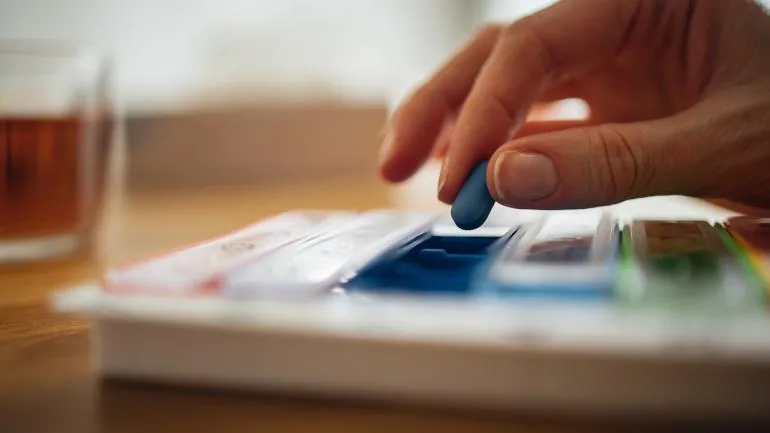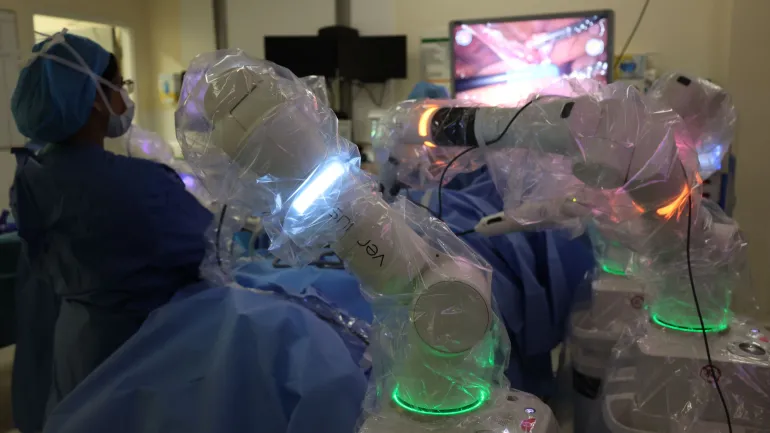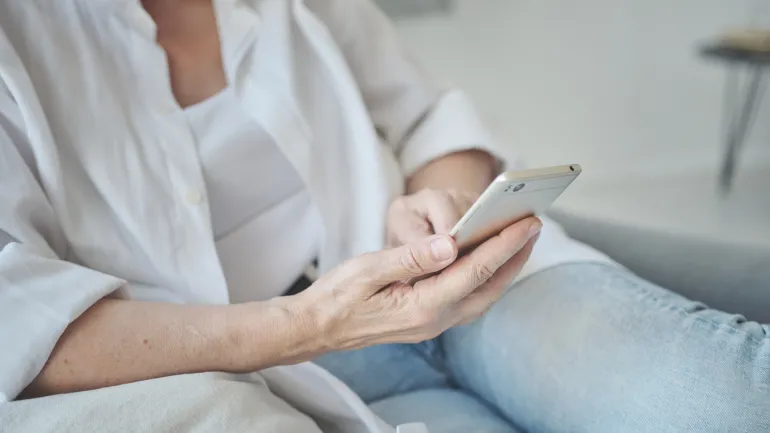Over the past year, we’ve seen incredible outcomes from supporting five transformative projects in our NHS and local authorities.
These five inspiring stories exemplify how Wales is a place of choice for health and social care innovation and investment, and demonstrate how this can make a real positive difference to the lives of people living here and our nation’s economy.

Our health and social care systems are currently facing unprecedented challenges. A growing backlog of care and waiting lists, significant fiscal pressures and our ageing population are all contributing.
Each story highlights how innovation is helping health and social care to address these issues – equipping staff, patients and service users with invaluable tools that improve outcomes, make services more efficient and fuel economic growth.
Improving outcomes for cancer patients
The All-Wales Robotic Assisted Surgery Programme is revolutionising access to cutting-edge robotic-assisted surgery for cancer patients throughout Wales. This surgery creates smaller and more precise wounds, cutting recovery time in hospital.
Patients in Wales previously had to travel long distances for robotic-assisted surgery. Now, NHS Wales has partnered with CMR Surgical – identified through our robust horizon scanning – to roll out equipment and training to new specialisms and locations.
We supported the programme from inception, developing the National Business Justification Case that helped secure approval and funding from Welsh Government.
Within the first two years, the programme has grown exponentially. By April 2023, eight new robotics teams were established across two Health Boards, bringing new training and recruitment opportunities to Wales. Over 100 robotic cases were also successfully completed. And by November 2023, the programme had trained ten teams and completed over 200 successful robotic cases.
Read the full Robotic Assisted Surgey Programme case study to learn more.
Rolling out innovative pain management technology to social care services
We helped to bring innovative AI-powered pain assessment technology to social care in Wales.
A major challenge in social care is assessing the pain relief needs of residents who can’t communicate such as people with dementia and learning difficulties.
PainChek, an AI-powered pain assessment app, scans facial movements to assess someone’s pain level. Recognising the potential of this technology for social care services in Wales, Life Sciences Hub Wales instigated a 12-month evaluation project with Gwent Regional Partnership Board. Almost a third of all care homes in Gwent signed up to take part, with around 1,000 care home residents benefitting.
Based on existing evidence, the project team expect to see wide ranging benefits, including reductions in the use of antipsychotic medications, improved use of pain relief (leading to reduced falls, better intake of food and fluids and improvements in other conditions), and greater carer and resident safety and satisfaction. Pending outcomes of the evaluation, Life Sciences Hub Wales is already in discussions with Welsh Government about a nationwide implementation of the tool.
Read the full PainChek case study to learn more.
Trialling medication management devices in Bridgend
We’re project managing an evaluation of a medication device that could transform how people in Wales can remain independent for patients in Cwm Taf Morgannwg University Health Board and Bridgend Local Authority.
Increasing medication needs are a significant challenge. For anyone looking to maintain independence, managing medication is essential. But it’s estimated up to 50% of prescribed medicines are not taken as intended.
We’re working with pharmacy and telecare services in Bridgend to evaluate the use of an innovative device that helps people remember to take their medication, and allows the telecare team to offer greater support when needed.
YOURmeds is a digital device that reminds users when to take medication and can send alerts to family members or care services if medication is taken incorrectly.
This evaluation project funded through Cwm Taf Morgannwg University Health Board’s Value Based Health Care Team will look at improved outcomes and experience through the lens of value and inform a potential rollout of devices to other regions across Wales. This could allow more people to successfully live independently in their own home, reduce the burden on families and emergency services, and improve the ability of primary and social care services to work together to improve support.
Read the full YOURmeds case study to learn more.
Trialling transcranial magnetic stimulation to help people with drug-resistant depression in Wales
It's thought that around 30% of people with severe depression continue to experience symptoms despite drugs or talking therapies. With increasing numbers experiencing mental health problems in Wales, it's vital we investigate options for other treatments.
Transcranial magnetic stimulation (TMS) is a non-invasive treatment that stimulates the areas of the brain that regulate mood. It’s been shown to help some patients with severe depression and is a less invasive and expensive treatment to electroconvulsive therapy (ECT). TMS is used worldwide but isn’t currently offered in Wales.
We supported this project to deliver a trial TMS service in Glangwili Hospital. Identifying the potential of TMS to make a real impact for some patients where other treatments had failed, we worked alongside technology providers Magstim, Hywel Dda University Health Board, Tritech Institute and Health Technology Wales to build an understanding of the existing evidence about this treatment and assess the challenges and opportunities for offering this service in Wales.
Following a successful trial, a business case is now being developed for its permanent feasibility within Hywel Dda University Health Board, and the potential for adoption in other health boards.
Read the full case study to learn more.
Harnessing technology for better wound care in the community
Life Science Hub Wales supported a project to introduce a pioneering new wound care technology to Wales. Our work with Swansea Bay University Health Board supported the roll out of Healthy.io’s remote monitoring app among district nursing and community wound care teams, improving how they manage wounds during home visits and clinic appointments.
Caring for wounds in the community requires input from different healthcare experts to prevent infection and encourage timely healing. This is expensive and time consuming for the NHS.
The new technology helps clinicians make better care decisions with a smartphone camera to accurately analyse wounds, recording the healing progress digitally to share with colleagues for specialist input without the need for costly additional appointments.
Time and efficiency savings from this new way of working have already allowed the wound clinic to offer an extra 1,872 appointments per year. It’s also prompting early detection of slow healing wounds and making patients more active in their own care.
Nearly 2,000 patients have already benefited. The project’s success has also led to wider work to develop a more consistent approach to wound care management across Wales.
Read the full Healthy.io case study to learn more.
Cari-Anne Quinn, Chief Executive Officer, at Life Sciences Hub Wales, said:
“We know that it’s an incredibly challenging time for our health and social care services right now. These examples highlight how innovation is helping us tackle these pressures and make a positive difference to people working and using services on the frontline of health and social care.
Life Sciences Hub Wales is so proud to have supported these diverse range of projects through our bespoke innovation support services – whether that’s been through project management, business case support or horizon scanning – and look forward to seeing how they’ll continue to help transform care.”
Whether you work in health, social care, or industry, we can support you in getting innovation to the frontline. Learn more about who we are and what we can do for you. Let’s work together to transform health and social care in Wales.



